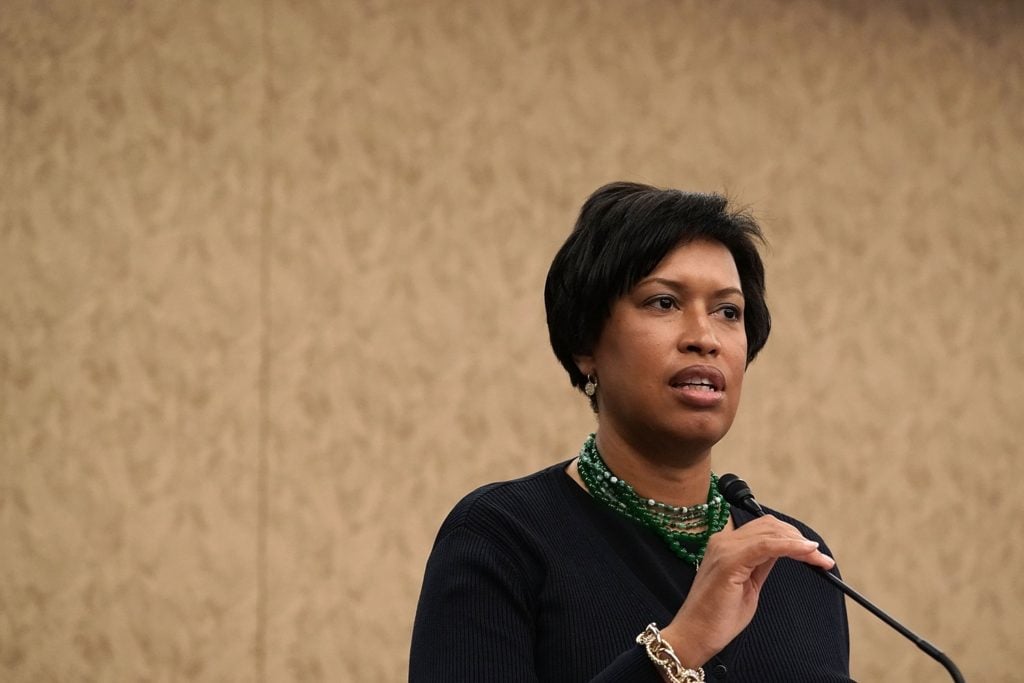Politics
After Outcry, the Mayor of DC Overrules the Local Grant-Giving Organization’s Attempt to Restrict ‘Lewd or Political’ Work
Since it went out on Monday, the controversial amendment has provoked widespread backlash.

Since it went out on Monday, the controversial amendment has provoked widespread backlash.

Henri Neuendorf

After a fierce outcry, Washington, DC, mayor Muriel Bowser today withdrew an amendment issued by the DC Commission on the Arts & Humanities (DCCAH) that would have imposed restrictions on the content of work produced by its grantees.
On Monday, the DCCAH issued the amendment in a notice to recipients who had been awarded money in its recent round of grants, forbidding work that is deemed “lewd, lascivious, vulgar, overtly political, excessively violent, constitutes sexual harassment, or is, in any other way, illegal.” The interpretation of what would be defined as “lewd, lascivious, vulgar, overtly political, excessively violent” would have been at the discretion of the commission.
For many observers in DC and beyond, this language touched off alarm bells about political censorship. DCCAH’s amendment was quickly condemned as an attempt to censor artists by numerous free speech groups including National Coalition Against Censorship (NCAC), the American Civil Liberties Union (ACLU), the Andy Warhol Foundation, and more.
In a statement, the NCAC said, “This attack on artistic freedom suggests renewed attempts at government censorship of the arts.”
Warhol Foundation president Joel Wachs called the amendment “a blatant attack on free speech and a direct threat to all artists and nonprofit organizations that produce challenging work, provide diverse perspectives, and confront social and/or political issues that are of vital importance to their communities.”
DC non-profit Washington Project for the Arts received $112,000 from three different grants from the DCCAH this year. Speaking to artnet News, the organization’s director Peter Nesbett said that there are a number of unusual things about the amendment, in particular that DCCAH was seeking to impose restrictions on grantees who already been approved for funding.
“There are a number of red flags,” he said, “but the biggest red flag is [the phrase] ‘overtly political content.’ If an artist were to do a project that in any way pictured the president in a way that could be construed as negative, the artist or that organization presenting the project could lose their grant or have their funds rescinded. That’s obviously incredibly troubling and it’s unconstitutional.”
Reflecting the widespread backlash leading up to Mayor Bowser’s decision to rescind the amendment, Nesbett said that he would not accept the new restrictions. “It’s a lot of money for us,” he admitted. “But our position is to prioritize freedom of expression over the receipt of the finds, so we’re not signing it.”
The exact origin of the amendment remains unclear. In the Washington City Paper, Kriston Capps notes that it was signed by the commission’s interim executive director Angie Gates, but that “an email circulated by one commission member indicated that ‘commissioners weren’t made aware of this before it was sent out to the grantees.'”
Capps also offers the following context:
A commission staffer, or someone at the commission, may have been triggered by a project by artist Marta Pérez-García. In October, the artist debuted an installation at the Frank D. Reeves Municipal Center. Her piece—an installation made with the D.C. Coalition Against Domestic Violence, survivors, and other advocates, and with $50,000 in funds from the DCCAH—featured cloth rag dolls and silhouettes suggesting police outlines.
Pérez-García’s project generated complaints, according to broadcast news reports. The artist had intended to place the dolls on the Reeves Center floor, but suspended them instead, since the building is prone to flooding, according to WUSA9. Some viewers reportedly thought that the installation evoked lynching.
The CAH did not respond to artnet News’s request for comment.
The full text of the now-withdrawn DCCAH amendment would have been the following:
The Parties hereby revise Section 5 of the Original Agreement by adding, as that section’s second paragraph, the following language: “Grantee warrants that neither Grantee’s performance under this Agreement nor any tangible manifestation of Grantee’s performance under this Agreement is lewd, lascivious, vulgar, overtly political, excessively violent, constitutes sexual harassment, or is, in any other way, illegal. The interpretation of what is “lewd, lascivious, vulgar, overtly political, and/or excessively violent” shall be at the sole discretion of CAH. In the event that Grantee’s Grant-related work product and/or performance under this Agreement is deemed to be lewd, vulgar, overtly political, and/or excessively violent, CAH reserves the right to terminate this Agreement (see “Termination” policies referenced below). These warranties survive indefinitely.”